IRGC-Linked News Agency Accuses Football Club Sponsor Of iPhone Smuggling
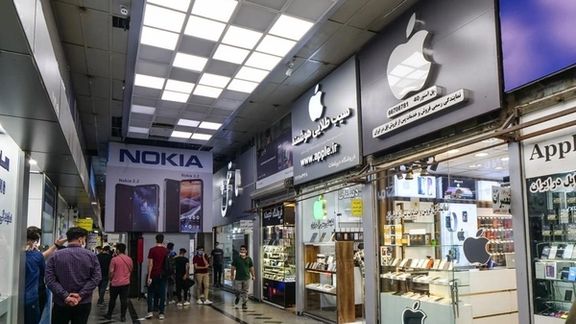
The Tasnim News Agency, associated with the Revolutionary Guards, has accused a new sponsor of the Esteghlal football club of engaging in the smuggling of iPhones.

The Tasnim News Agency, associated with the Revolutionary Guards, has accused a new sponsor of the Esteghlal football club of engaging in the smuggling of iPhones.
In the past year, the Islamic Republic has not registered iPhone 14 and 15 models, and in recent weeks, following the introduction of the iPhone 15 to the market, it declared the buying and selling of the devices as “illegal”, citing them as contraband.
Citing the Amol Mobile Shop, the Tasnim report stated, "An examination of some viral videos in the virtual space shows that the new sponsor has been involved in offering prohibited iPhone 15 series in recent weeks."
Meanwhile, the secretary of the Coordination and Supervision of the Fight Against Smuggling of Goods and Foreign Currency in Khorasan Razavi stated that the confiscation of iPhones, specifically the 14 and 15 models, has commenced.
He announced that all relevant entities have received instructions to take action against those responsible for selling iPhones, and devices that assist in antenna reception are considered contraband and their sale is prohibited.
In August 2022, Supreme Leader Ali Khamenei issued a call to prohibit the import of "luxury American phones" into Iran.
"Nat'l production is key to employment, welfare, reducing inflation & increasing nat'l currency's power," Khamenei tweeted on his Russian language account, from an iPhone. "An obstacle to production is unneeded imports like luxury products. Last year, half a billion dollars were spent to import a certain luxury US mobile brand. Govt must stop this."
Suggesting the ban was a bid to cut national expenses, state news website Press TV claimed in February that the ban on Apple's iPhone 14 models alone would cut the country's six month import bill by at least $1bn.
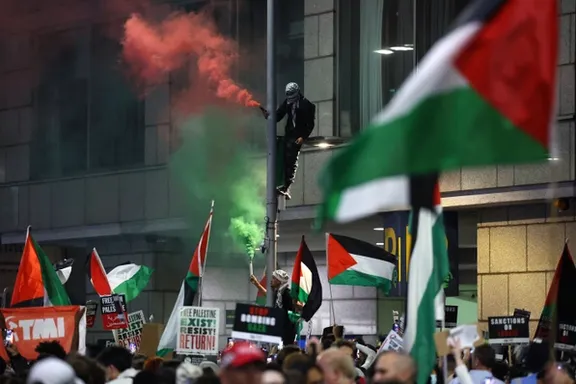
The Metropolitan Police Commissioner has admitted that the UK capital’s police force has “a gap” in how it deals with Islamic extremism.
His comments come after tens of thousands of protesters came to the streets of London in Iran-backed demonstrations calling for ‘free Palestine’.
As revelations came to the extent of the extremist sentiment at the rally in central London, Commissioner Sir Mark Rowley admitted on Sky News: “There's bodies of law to deal with terrorism and hate crime but nothing to deal with extremism. This leaves a gap.”
In The Times on Saturday, it was revealed that Tehran is behind the protests as it tries to escalate tensions against its archenemy Israel amidst its war with Hamas in Gaza which broke out on October 7 when Hamas militia invaded Israel in a terror attack. Thousands came by land, air and sea, killing at least 1,400, mostly civilians, and kidnapping 230 more.
The demonstrations have also raised serious questions about the UK’s dealings with extremism in a year when the UK’s top security and political chiefs admitted that Iran remains one of the UK’s biggest threats.
In the article in Saturday’s The Times, it said police sources admitted that protests were found to be “directly linked to the Iranian regime and includes a campaign of online disinformation and Iranian operatives being physically present at protests”.
The UK has refused to designate the Islamic Revolutionary Guards Corps as a terrorist organization, designated by the US, in spite of numerous attempted attacks on UK soil.
Earlier this month, the UK’s counter extremism commissioner, Robin Simcox, warned that the “scale of Iranian-backed activity in this country; and the extent to which Iran attempts to stoke extremism here” was massively under addressed.
MI5 chief Ken McCallum also addressed the issue this month, warning that while Iran has been posing a threat for “a long time”, Iran’s proxy war on Israel would take things in a new direction.
“In particular, the last 18 months or so have been a particularly intensive phase of Iran-generated threat on UK soil. Plainly, events in the Middle East sharpen the possibility that Iran might decide to move into new directions”, he said.
Following Saturday’s protests, analyst Amy Mek wrote on X that “Islamic Terror accounts on Twitter are reporting (celebrating) that Muslim Hamas supporters have overpowered police and are marching toward the Israeli embassy while shouting genocidal jihad chants.
She wrote of the Muslims chanting ‘Khaybar Khaybar ya yahoud’ meaning ‘we will exterminate the Jews today just as Mohamed massacred them in the Khaybar oasis in 629’ in rallies in Trafalgar Square.
“Muslims once again are promising death to Israel and death to the Jews,” she wrote.
Pointing out the problematic issue long challenging the UK which has always raised controversy for the human rights it grants terrorists: “Being accused of Islamophobia have resulted in arrests and prosecutions in the United Kingdom. However, the disturbing double standards of speech policing are evident when Muslims call for the death of Jews and Jihad on the streets of London.”
The UK’s problems are not only confined to Iran, and it is not only the UK which is seeing a rising tide of Islamic extremism, mass protests taking hold across Europe.
Simcox earlier this month raised the red flag to numerous clerics which are on UK soil, several of them praising the barbarity associated with the likes of Al Qaeda and ISIS.
Controversial figures such as Abu Hamza and Anjem Choudary have long been met with calls for more strict management of the country’s mosques.
One counter terrorism expert in the UAE said the issue lies with the country’s failure to enforce integration. “These preachers come from their home countries and preach as if they are still in their home countries, without integrating their communities to be a part of society, so their loyalty is never with their adopted country.
“They stay aligned with the plight of the people back home and rather than see themselves as British Muslims, they continue to be whatever their original nationality is, only abroad. The UK has long failed to find a way to train and integrate its clerics.”
Earlier this year, a review into the country’s Prevent programme, a counter terrorism intervention scheme, found that it had spent more time focusing on the far right that Islamic extremists, leading in one case to the murder of an MP.
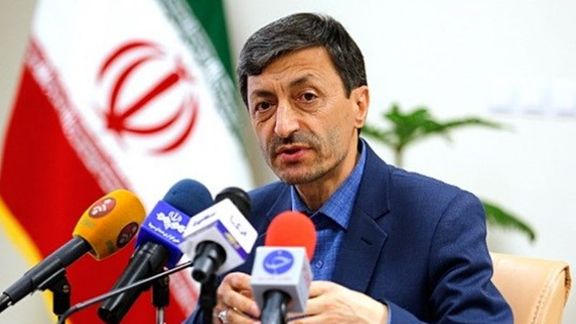
Iran's Supreme Leader has appointed a heavily sanctioned ex-IRGC member to head the Execution of Imam Khomeini's Order (EIKO), a vast economic conglomerate under his personal control.
Parviz Fattah is a prominent Iranian conservative politician who has previously served as a member of the Islamic Revolutionary Guards Corp (IRGC) and held the position of Minister of Energy in Mahmoud Ahmadinejad's first cabinet from 2005 to 2009.
The US Treasury Department imposed sanctions on Fattah in 2010 due to his involvement with Bonyad Taavon Sepah, an organization that provides services to the Islamic Revolutionary Guard Corps (IRGC). Additionally, he was sanctioned by the US Treasury in November 2020 due to his connections with Supreme Leader Ali Khamenei.
EIKO was also sanctioned in 2021, days before President Trump left office, which was imposed for Iran’s destabilizing activities in the Middle East and its missile program.
The conglomerate, under Khamenei's control, has extensive assets across Iran, and is believed to be orchestrating an increasing number of confiscations of properties belonging to the Iranian minority Baha’is community, one of the most persecuted minorities in Iran.
Fattah also led the Imam Khomeini Relief Foundation from 2015 to 2019 and has been the head of the Mostazafan Foundation since 2019.
As part of the reshuffling, Hossein Dehghan, a former IRGC air force officer with the rank of brigadier general and former Minister of Defense of Iran, has taken over as the head of the Mostazafan Foundation, succeeding Fattah.
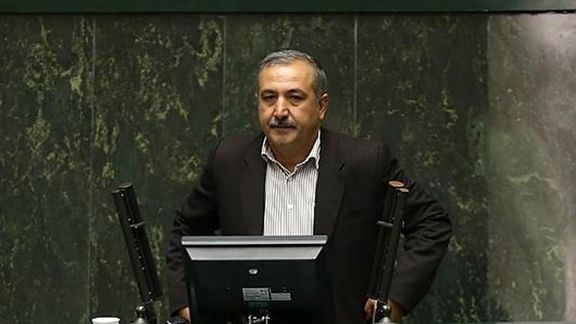
An Iranian Member of Parliament has exposed a widespread campaign of purges, suspensions, and dismissals affecting school administrators across the country.
Jalal Mahmoudzadeh, speaking on Sunday, provided alarming statistics, stating that approximately 15,000 to 20,000 school administrators have been replaced since the appointment of Reza Morad Sahraei as the Minister of Education.
The "purification process," as described by the MP, has extended its reach from universities to the education sector, resulting in the sidelining of teachers, school administrators, and even the expulsion of professors. The campaign shows no signs of slowing down.
The developments come on the heels of Reza Morad Sahraei's announcement last month that a "transformation plan" would be implemented in 5,000 schools during the current Iranian year, scheduled to conclude on March 20, 2024. The plan was initiated after a wave of anti-government protests involving numerous school students. Sahraei has committed to ongoing changes and expansion of the program.
The term "political purification," widely discussed in Iranian media, extends beyond educational institutions. Various organizations and institutions have faced similar purges as hardline elements of the regime sideline their rivals. The notion of "purification" was initially coined by former Parliament Speaker Ali Larijani to describe the actions of ultraconservative allies of President Raisi, aiming to consolidate government power by marginalizing other politicians and officials.

Security forces have arrested an unknown number of people who attended the funeral of Armita Geravand, the latest victim of Iran’s hijab enforcement.
The Iranian teenager died Saturday after about a month in coma for brain damage she suffered during a violent encounter with hijab enforcers deployed at Tehran’s subway stations. Her body was laid to rest at Tehran’s Behesht-e Zahra cemetery amid a heavy security presence.
Hengaw, a Kurdish human rights group, said Sunday that several of Armita’s relatives were arrested at her funeral service while the participants chanted against the regime. Her body was reportedly not released to the family until the security apparatus made sure that her family home, the hospital where she died and her burial site were surrounded by security agents.
At the funeral, not only were security forces stationed at the burial site, but at least three 360-degree cameras were installed there to record the service and detect anyone speaking against the government. Agents, who hugely outnumbered the funeral participants, also prevented people from recording the event and confiscated cell phones of the participants who tried to film the funeral.
It remains unknown what exactly happened on October 1 when Armita was confronted by morality police. The regime released doctored footage of her at the subway to exonerate its hijab enforcers. The widely accepted narrative is that a woman agent pushed her, and Armita fell and hit her head on the ground. However, authorities seem to have failed to convince Iranians, who believe hijab enforcers were responsible for her death. Authorities claim her head injury was caused by low blood pressure and fainting.
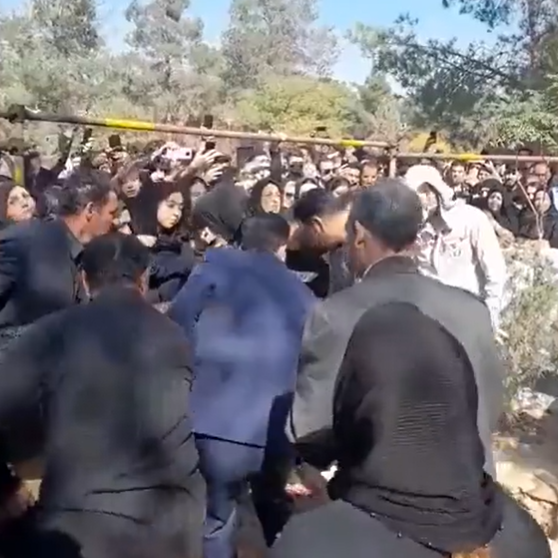
To prevent the repeat of anti-regime protests sparked by the death of Mahsa Amini at the hands of hijab police, Iranian authorities have imposed a full ban on reporting about Armita's death. Following the death of Mahsa Amini in September 2022, the Iranian clerical regime is worried about a resurgence of the extended anti-establishment protests and the 'Women, Life, Freedom movement' seen last year.
The circumstances of this latest case closely resembles that of Amini. In both instances, the regime denied any wrongdoing but pressured the families to refrain from speaking to the media.
The death of Armita has reignited anti-regime sentiments with people starting chanting slogans from their rooftops and windows on Saturday night.
Narges Mohammadi, the imprisoned human rights activist who recently received the Nobel prize for peace, issued a statement from prison saying, “Armita, full of the zest of life, was sent to her death because she had no intention of concealing her beautiful hair under compulsory hijab rules."
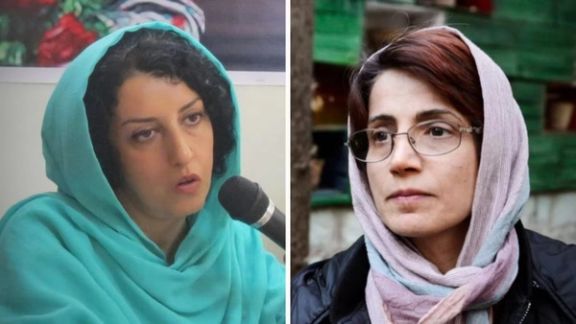
Prominent female dissident Zahra Rahnavard, under house arrest since 2011 along with her husband Mir-Hossein Mousavi as leaders of Iran's anti-regime Green Movement, warned the Islamic Republic against fighting against Iranian women and girls. She called on the regime to abolish the "wretched law of compulsory hijab," or the "stigma of suppressing girls will remain on their foreheads forever." Rahnavard stated that the rulers of Iran see their survival in the enforcement of mandatory hijab. The Green Movement emerged after the disputed 2009 presidential election, demanding the annulment of Mahmoud Ahmadinejad's re-election.
Prominent lawyer and rights defendant Nasrin Sotoudeh said in a statement, "Once again, another regime-sanctioned murder, this time of Armita Geravand, a murder that every Iranian feels very close to." She also called on people to hold rallies at subway stations “to protect our youth.” According to information obtained by Iran International, Sotoudeh was arrested Sunday at Armita's funeral.
Prominent expatriate opposition figures including Nobel Laureate Shirin Ebadi, Canada-based Hamed Esmaeilion, exiled Crown Prince Reza Pahlavi, and the US-based activist Masih Alinejad have also condemned the killing of Armita Geravand.
Pahlavi, who has become a leading opposition figure since the Women, Life, Freedom protests broke out, said, “Those who killed Armita are the same ones who killed Mahsa Amini, the same ones who killed Majid Reza Rahnavard, the same ones who killed 1,500 in November 2019, the same ones who killed our youth in December 2017, the same ones who killed Neda Agha Soltan, the same ones who killed Fereydoun Farrokhzad, the same ones who killed Shahriar Shafiq, the same ones who killed Farrokhro Parsa…”
“The battle between us and them is a battle between good and evil, and until we win this battle, they will kill us and there will be no justice. Onward, together, towards victory for Iran,” he added.
Iranian expatriate communities also held anti-regime demonstrations in memory of Armita in several cities around the globe, such as Hamburg and Frankfurt in Germany, Vancouver in Canada, and Stockholm in Sweden.
Reactions to Armita’s death are also pouring in by foreign officials. The US special envoy for Iran, Abram Paley, said, “Iran’s state-sponsored violence against women and girls has been devastating for so many families in Iran and abroad.”
German member of the European Parliament, Hannah Neumann, said that Armita was killed “because some Islamist regime thinks it is okay to beat children to coma for not wearing hijab. A regime that betrays its youngest has no future.” She also claimed that “The regime wanted to pick a moment where global attention is elsewhere to announce her death," referring to the Hamas-Israel war, a bloody conflict fueled by the regime.
German Foreign Minister Annalena Baerbock said, “Armita was only 16. A child, a student with a whole life still ahead of her. The brutality of the regime has robbed her of her future.” She added, “The future of Iran is its youth. The future of Iran is its women. The regime cannot suppress their desire for freedom.”
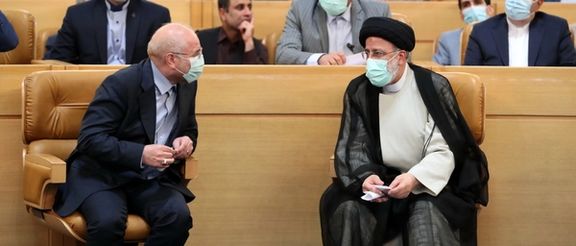
In the midst of the Islamic Republic's political landscape, a Shakespearean drama unfolds, with top characters from within Supreme Leader Ali Khamenei's inner circle.
The central figures in this unfolding narrative are President Ebrahim Raisi, Khamenei’s obedient, handpicked functionary, and former police chief and air force pilot, IRGC General Mohammad Bagher Ghalibaf, who has transitioned into politics, most recently holding the position of Speaker of the Iranian Parliament (Majles).
This ongoing rivalry between the two protagonists is characterized by a level of animosity that seemingly leaves no room for compromise, resembling a "it's either me or you, or both of us must fall" scenario.
Superficially, the drama, as explained in a Khabar Online report, revolves around, among other things, the parliament rejection of the President Raisi's seventh five-year development plan and changes to the government's Hijab law beyond recognition. According to Khabar Online, the Majles has handled government bills in a manner that suggests a lack of faith in the Raisi administration's ability to draft effective legislation.
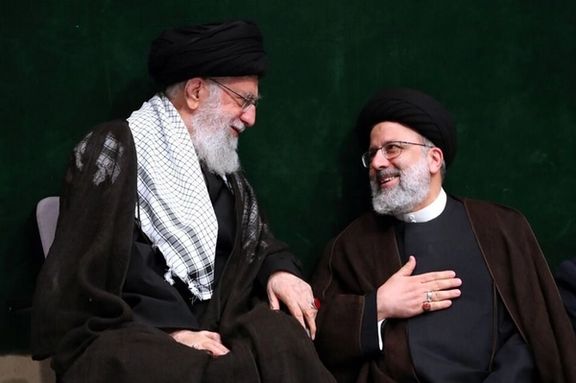
In recent months, Raisi has written several letters to Khamenei, expressing his grievances regarding the parliament and its Speaker's conduct. Other high-ranking officials, such as Expediency Council Chief Sadeq Amoli Larijani, have also noted that Raisi tends to seek solutions from Khamenei for his government's issues with other officials.
However, it is no simple task the Supreme Leader to decide about the dispute between two of his key obedient officials. Previous governments did not unquestioningly implement all of Khamenei's orders and shoulder all the blame for policy failures without complaint.
Furthermore, Ghalibaf is not just a regime member; he is also a relative who holds a closer connection to Khamenei's wife and his ambitious son, Mojtaba. This dynamic makes it exceedingly challenging for Khamenei to discipline Ghalibaf, who has demonstrated unwavering loyalty when it comes to suppressing dissent and protests, regardless of his government position.
At a deeper level, however, the antagonism is something more than administrative and legislative disputes between the heads of two of the three branches of the Islamic Republic government.
Based on other Iranian media reports, Ghalibaf has still not stomached the fact that he was forced by Khamenei's office to step down as the most popular conservative candidate in the 2017 presidential election in order to raise Raisi's profile and give him a chance to win the election against moderate Hassan Rouhani. During that election, the ultraconservative Paydari Party decided to take advantage of Ghalibaf's absence and continued to support its own candidate, former nuclear negotiator Saeed Jalili, in competition with Raisi and Rouhani.
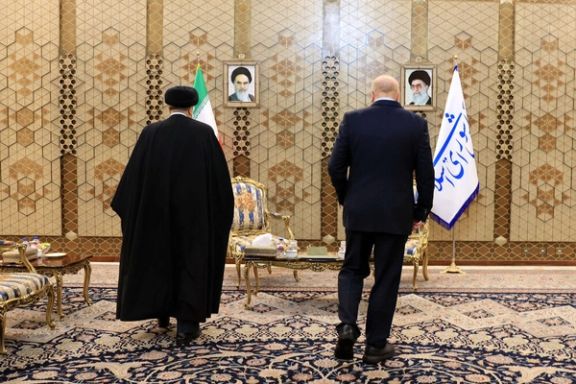
Paydari Party was convinced that Ghalibaf was the most popular candidate among the trio and believed that in his absence their candidate Jalili was able to win the election. But as it turned out, not only he failed to win the election, his instance on remaining in the race fragmented the conservative vote, leading to Hassan Rouhani’s victory. Ghalibaf's hard feelings against Raisi and Jalili has continued to date.
Reports suggest Paydari is actively preparing candidates for both the parliamentary elections in March 2024 and the presidential election in June 2025. The party's ideal candidate for the parliament is Paydari leader Sadeq Mahsouli, and its man to compete for the next presidency is no one other than Saeed Jalili.
Paydari's hope to win the Majles and the post of its speaker appears to be more realistic than its plans for presidency. Although almost every politician in Iran agrees that Raisi's track record in his first four years in office leaves no room for his at the presidential office in 2025, there is no indication yet of Khamenei's inclination to kick Raisi out of the core of his government. Against all odds, he is more likely to be allowed to run and win the next presidential elections.
While Paydari's prospects for winning the Majles and securing the Speaker's position appear promising, their presidential ambitions are more challenging. Although most Iranian politicians agree that Raisi's track record during his first term leaves little room for his re-election in 2025, there are no indications of Khamenei's inclination to oust Raisi from the heart of his government. Despite the odds, Raisi is more likely to be permitted to run and potentially win the next presidential election.
However, Paydari has previously demonstrated its power to secure the Speaker's position in the Majles. Currently, Ghalibaf has retained this role by making several concessions, including assigning all presidium positions to Paydari. Nevertheless, relations between the party and Ghalibaf have deteriorated, and Ghalibaf prefers to run for the presidency rather than remain a member of the parliament. As far as he is concerned, post-2025, it will be either him or Raisi in the political spotlight.